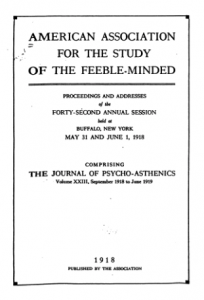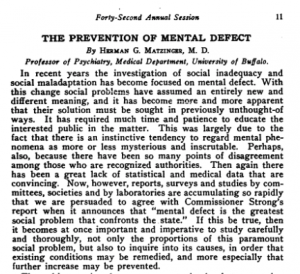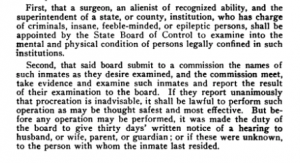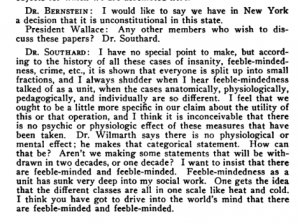During the late 1800s and early 1900s, many states within the U.S. began to legalize the sterilization of woman with physical and intellectual disabilities (Burgin 2018). The American Journal of Mental Deficiency printed the minutes from a meeting of the “American Association for the Study of the Feeble-Minded”. This is the association discussed above, that has continuously changed it’s name as the historical context of individuals with disabilities has evolved in this country. Within these minutes are members published work that is read for the meeting and then discussed and critiqued during the meeting. The pieces of work “The Prevention of Mental Defect by Herman G. Matzinger, M.D. and “The Practical Working Out Of Sterilization” by A.W. Wilmarth, M.D. are included in the minutes. These were then discussed as a group within the members following the reading of them.

The cover of the journal https://babel.hathitrust.org/cgi/pt?view=image;size=100;id=mdp.39015072906616;q1=discussion;page=root;seq=32;num=26

Beginning arguments of Herman G. Matzinger M.D. on “The Prevention of Mental Defect” https://babel.hathitrust.org/cgi/pt?view=image;size=100;id=mdp.39015072906616;q1=discussion;page=root;seq=32;num=26

Excerpt from “The Practical Working Out Of Sterilization” by A.W. Wilmarth, M.D. https://babel.hathitrust.org/cgi/pt?view=image;size=100;id=mdp.39015072906616;q1=discussion;page=root;seq=32;num=26

Excerpt from the “Discussion” between members https://babel.hathitrust.org/cgi/pt?view=image;size=100;id=mdp.39015072906616;q1=discussion;page=root;seq=32;num=26
As you can see by the excerpts above, not every committee member agrees with one another, but there are quite a few members that are fighting for sterilization as a way to prevent intellectual disabilities. Within these meeting minutes, there is heavy debate whether sterilization is constitutional, and examples of cases that are being brought to the Supreme Court. What I find most fascinating and compelling, though, is Dr. Southard, who is arguing that the vast generalizations and sweeping definitions of individuals with disabilities is a problem. This problem of assuming all people with disabilities are the same, with one solution, one diagnoses, one definition is a problem we continued to struggle with in the 21st century.
